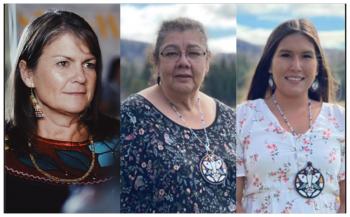Image Caption
Summary
Local Journalism Initiative Reporter
Windspeaker.com
The Ontario Native Women’s Association (ONWA) is golden. The organization celebrated its 50th anniversary in October with the election of a new president after almost two decades and the making of a commemorative documentary.
ONWA, which was created in 1971, is a not for profit organization that supports Indigenous women and their families throughout Ontario. Support is provided through advocacy, research, policy development and programs.
ONWA is the longest-running Indigenous women’s organization in the country. It was founded three years before the Native Women’s Association of Canada.
Dawn Lavell-Harvard, who has served as ONWA president the past 18 years, stepped down from her position and was replaced by Debra Vermette in an election held Oct. 23. Autumn Cooper was elected Vice President. Cooper is Lavell-Harvard’s daughter, and the granddaughter of ONWA co-founder Jeannette Corbiere-Lavell.
“A lot of people forget how ONWA started,” Lavell-Harvard said. “Back in the 1970s, when my mom lost her (Indian) status, she was at the Supreme Court struggling to get her status back.”
While various groups were speaking out against her mother at the time, she decided to help create her own organization since few were speaking up for women.
“We’ve never lost touch with our vision,” Lavell-Harvard said, “which is that we are here as a group of grassroots women working in grassroots families and communities, working around kitchen tables and backyard fires to make our lives better. And we have never lost sight of that because that is our foundation, our culture and who we are.”
Lavell-Harvard said ONWA has retained its principles since its inception.
“One of the other most important things we have never lost sight of is that we accept everyone,” she said. “We don’t argue about who has a status card and who doesn’t. We don’t talk about who has membership and who doesn’t.
“This is for all of our Indigenous sisters, all of our mothers, our grandmothers, aunties, daughters, cousins and all of our families because we are inclusive and we are all about bringing everybody in. Those are the most foundational things from our beginning that we have never lost sight of.”
ONWA officials believe placing a focus on Indigenous women has the ability to boost communities. Reconciliation with communities translates into the inclusion of Indigenous women’s voices for issues affecting their lives.
Cora McGuire-Cyrette, ONWA’s executive director, said 55,000 people benefitted from the organization’s services in 2021.
“It blows my mind,” she said about the number of people supported this year. “Without core sustainable funding, it goes to show that you’ve maximized the resources. It goes to show the commitment of the team to not say no to anybody.”
ONWA currently has 140 staff members spread out across the province. ONWA’s head office is located on Fort William First Nation in northern Ontario. ONWA also has offices in Toronto, Hamilton, Longlac, Kenora, Napanee, Ottawa, Sioux Lookout, Thunder Bay and Timmins.
“We continue to succeed and excel, regardless of the barriers, regardless of the uphill battle,” said McGuire-Cyrette. “It shouldn’t be a big fight but it always is.”
McGuire-Cyrette said a documentary about ONWA was being released in honour of the association’s 50th year. It has been shown to staff and a public release is being planned for the new year.
“It’s one part of the story,” she said of the film. “And it’s really to support our future generations.”
Local Journalism Initiative Reporters are supported by a financial contribution made by the Government of Canada.

